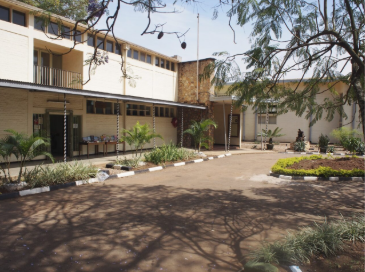Experience from previous collaboration
On museum collaboration - how does previous experience affect the current project?
The University of Zurich has been working with academic institutions in Uganda for a long time, in particular with Makerere University in Kampala, Uganda, the oldest and most renowned university in East Africa. In 2008, UZH formalised its partnership with a Memorandum of Understanding.
Since 2014, the Ethnological Museum of the University of Zurich, under the direction of Dr Thomas Laely, has been working together with two of the most important museums in Uganda in a long-term cooperation: The Uganda National Museum in Kampala and the privately run Igongo Cultural Centre in Mbarara in western Uganda. The collaboration was entitled ‘Points of view - visions of a museum partnership between Uganda and Switzerland’.
Uganda National Museum
It included joint research in both countries, co-curated exhibitions and the exchange of experience and knowledge. Museological best practices were also discussed. In addition to more technical inventory issues, the focus was also on how communities associated with the collections and external interest groups can be involved.
From 2017 to 2018, three stationary exhibitions on the topic of dairy farming in East Africa and the Alpine region were opened in the museums in Uganda and Switzerland. Thanks to a ‘mobile museum’ in a converted lorry, the exhibitions in Uganda also reached remote, rural communities.
- The Power of Milk Exhibiton, Igongo Cultural Institute
- Drink Deeply! Milk Exhibition, Uganda National Museum
- Sichweisen. Visionen einer Museumspartnerschaft, Völkerkundemuseum der Universität Zürich
- Exhibition on Wheels: Mobile Dairy Museum Tours Uganda
After completion of the project, the Ugandan partners suggested a follow-up project on the topic of medicinal plants and herbal medicine, which was further developed by the international project team between 2019 and 2022. In 2022, the Botanical Garden and the Institute for Evolutionary and Systematic Botany were acquired as new project partners instead of the Ethnological Museum.
The necessary research and the implementation of the exhibitions in Uganda are generously supported by the Lottery Fund/Common Good Fund of the Canton of Zurich and the Swiss National Science Foundation (SNSF)/‘Solution Oriented Research for Development’ (SOR4D) programme.
Research conducted over large distances requires a good relationship of trust. This also applies to the exhibition, publication and communication projects realised in close coordination with each other. It is important to be aware of the uncertainties and potential risks. A prerequisite and decisive advantage is being able to build on a long-standing partnership and a long-term commitment, a relationship of trust and ‘critical friendship’ that also allows for content-related and personal disputes.
The project team sees its work as a contribution to the development of participatory, decolonised scientific and museum practices and critically reflects on the opportunities and challenges of participatory collaboration on an equal footing. The intention behind this is to break through entrenched hierarchical and (neo-)colonial structures of knowledge production and dissemination in museum and scientific practices and to emphasise mutual learning processes.
Literature:
Grigo, Jacqueline; Laely, Thomas (2023). Attempts to Decolonize Knowledge Production in Museum Practice. Critical Reflections on a Collaboration between Uganda and Switzerland; in: Recherches Sociologiques et Anthropologiques, 53(2):119-151. DOI: https://doi.org/10.4000/rsa.5709
Grigo, Jacqueline (2019). Points of view. Kritische Reflexion einer transnationalen Museumskooperation. In: Groth, Stefan; Christian, Ritter. Zusammen arbeiten. Praktiken der Koordination und Kooperation in kollaborativen Prozessen. Bielefeld: Transcript Verlag, 79-110.
Laely, Thomas, Marc Meyer, and Raphael Schwere, eds. 2018. Museum Cooperation between Africa and Europe. A New Field for Museum Studies. Museum 33. Bielefeld: Transcript; Kampala: Fountain Publishers.
